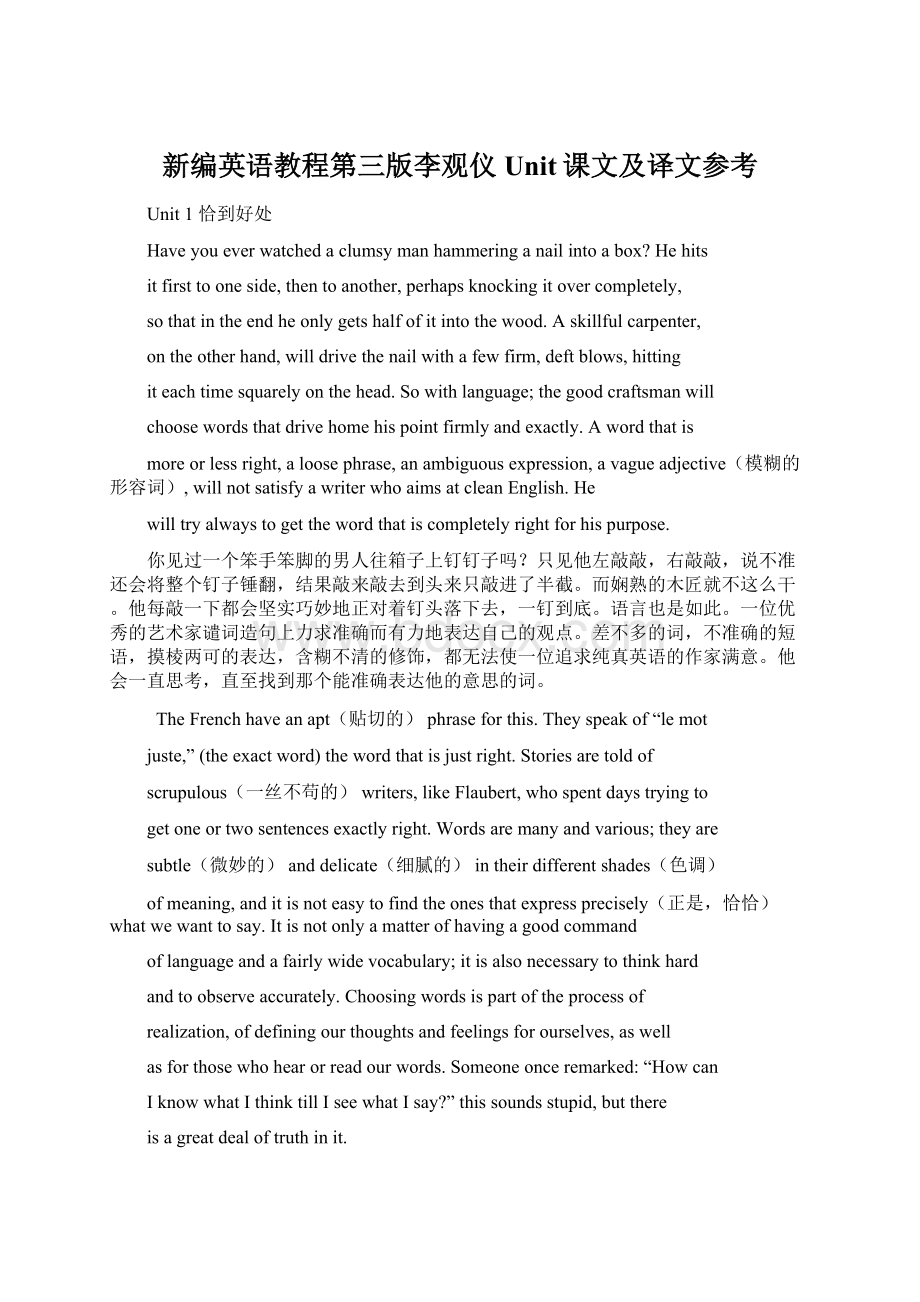新编英语教程第三版李观仪Unit课文及译文参考Word格式.docx
《新编英语教程第三版李观仪Unit课文及译文参考Word格式.docx》由会员分享,可在线阅读,更多相关《新编英语教程第三版李观仪Unit课文及译文参考Word格式.docx(33页珍藏版)》请在冰豆网上搜索。

他会一直思考,直至找到那个能准确表达他的意思的词。
TheFrenchhaveanapt(贴切的)phraseforthis.Theyspeakof“lemot
juste,”(theexactword)thewordthatisjustright.Storiesaretoldof
scrupulous(一丝不苟的)writers,likeFlaubert,whospentdaystryingto
getoneortwosentencesexactlyright.Wordsaremanyandvarious;
theyare
subtle(微妙的)anddelicate(细腻的)intheirdifferentshades(色调)
ofmeaning,anditisnoteasytofindtheonesthatexpressprecisely(正是,恰恰)whatwewanttosay.Itisnotonlyamatterofhavingagoodcommand
oflanguageandafairlywidevocabulary;
itisalsonecessarytothinkhard
andtoobserveaccurately.Choosingwordsispartoftheprocessof
realization,ofdefiningourthoughtsandfeelingsforourselves,aswell
asforthosewhohearorreadourwords.Someoneonceremarked:
“Howcan
IknowwhatIthinktillIseewhatIsay?
”thissoundsstupid,butthere
isagreatdealoftruthinit.
法国人有一个很贴切的短语来表达这样一个意思,即“lemotjuste”,恰到好处的词。
有很多关于精益求精的作家的名人轶事,比如福楼拜常花几天的时间力求使一两个句子在表达上准确无误。
在浩瀚的词海中,词与词之间有着微妙的区别,要找到能恰如其分表达我们意思的词绝非易事。
这不仅仅是扎实的语言功底和相当大的词汇量的问题,还需要人们绞尽脑汁,要观察敏锐。
选词是认识过程的一个步骤,也是详细描述我们的思想感情并表达出来使自己以及听众和读者深刻理解的一个环节。
有人说:
“在我思想未成文之前,我怎么知道自己的想法?
”这听起来似乎很离谱,但它确实很有道理。
Itishardworkchoosingtherightwords,butweshallberewardedby
thesatisfactionthatfindingthembrings.Theexactuseoflanguagegives
usmastery(掌握)overthematerialwearedealingwith.Perhapsyouhave
beenasked“Whatsortofamanisso-and-so(某某等)?
”Youbegin:
“Oh,
Ithinkhe'
squiteanicechap(家伙)buthe'
srather…”andthenyou
that
himaboutisitwhatexpresstophraseorwordafindtotryinghesitate
findthehislimitation.Whenyouyoudon'
tlike,thatconstitutes(构成)andsharper.yourconceptionofthemanisclearerrightphraseyoufeelthat
我们就会感到很欣慰:
寻找恰如其分的词的确是件不容易的事。
一旦找到了那个词,辛劳得到了回报。
准确地用语言有助于我们深入了解我们描述的事物。
例如,当有人问你:
“某某是怎么样的人?
”你回答说:
“恩,我想他是个不错的家伙,但他非常……”接着你犹豫了,试图找到一个词或短语来说明他到底讨厌在哪里。
当你找到一个恰当的短语的时候,你发觉自己对他的看法更清楚,也更精确了。
senses.differentcommonrootbutareusedinverySomeEnglishwordshavea
)(humanhumaneoriginisthe人道,仁慈的andTheirConsider,forexample.
humansameandtheirmeaningsarerelated,buttheirusageisdistinct.A
humaneaction.Wecannotspeakofaactionisnotthesamethingasa
humaneHumanekiller,Rights.---ThereisaweaponcalledaDeclarationofhumanbutitisnotakiller.二者的词根相一些英语词汇词根相同而意义却截然不同。
例如human和humane,action但用法完全不同。
“humanaction(人类行为)”和“humane同,词义也相关,而是说“人权宣言”。
(人道行为)”完全是两码事。
我们不能说“人道权力宣言”,杀人humankiller(有一种屠杀工具叫“humanekiller(麻醉屠宰机),而不是。
机器)thavetolookfarafieldtofindevidenceofbadcarpentryin'
Wedonletter:
hisdinner,finishedreplyinglanguage.Astudent,toaninvitationto
anxiety.amlookingforwardtothedaywith”and“IshallbedelightedtocomeI
Anxietymeantwritersuggestionsofworryandfear.Whatthewithcarriesit
eagernesseagernessAnxietywithsomekinshipwaspossibly(亲属关系).has
butitwillnotdoasasubstitute(替代)inthiscontext.语言中的坏手艺的例子在我们身边随处可见。
有人邀请一名学生去吃饭,他写信给
)期予回复。
请看他的信是这样结尾的:
“我将很高兴赴约并满怀不安(anxiety
”“Anxiety”含有烦恼和恐惧的意味。
作者想表达的很可待着那个日子的到来。
“Anxiety”跟热切期盼有一定的关联,但在这个场合能是一种翘首期盼的心情。
是不能等同的。
whichthePressinapoliticalpartyUgandawrotealettertoofTheleader
e:
containedthissentenc乌干达一政党领袖给新闻界的一封信中有一句这样写道:
Letusallfightthisselfishness,opportunism,cowardiceandignorance
nowrifeinUgandaandputintheirplacetruth,manliness,consistencyand
singularityofmind.让我们打破这自私、投机、怯懦和无知充斥的乌干达,代之以真理,刚毅,坚定和奇异的精神。
Thisstirringappealisspoiltbyamalapropisminthelastphrase,the
singlenesssingularityofmind,word.Whatthewritermeant,Ithink,was
inmind,withoutbeingdrawntheholdingsteadfastlytopurposeasidebyless
Singularityodditypeculiarity,somethingthatworthyobjects.ormeans
singlesamanoutfromothermen
这一激动人心的呼吁被最后一个词“奇异(singularity)”的误用破坏掉了。
我猜想作者真正要表达的意思是思想的专一,即抱定一个信念永不改变,咬定青山不放松,不被次要的目的干扰。
而singularity指的是古怪,特性,是将一个人从众多人中区分出来的那种东西。
.
Withoutbeingamalapropism,awordmaystillfailtobetherightword
leaderjournalist,writingapurpose,thewriter'
sthe“motjuste”.Afor
aboutChristmas,introducedaquotationfromDickensbysaying:
即使没有出现词语误用,这词仍可能不是符合作者意图的恰如其分的词。
一名记者
在一篇有关圣诞节的社论中这样引出狄更斯的话:
imprisonedinthisAllthatwaseverthoughtorwrittenaboutChristmasis
Imprisonmentmeaningif….the,suggestsforce,coercion(强迫)assentencesummed
containedorwereheldagainstitswill.Itwouldbebettertowrite
Epitomizedupmightdo,thoughitisratheraclumsy-sounding(集中体现).
wemighthitonthemotjuste”word.Searchingalittlefartherforthe“summedupcontained()distilled.提取orword.Thishasmoreforcethan
andwemightfurtherimprovethesentencebyDistillationsuggestsessenceaddingthiswordatthebeginning:
在这句话任何有关圣诞节的想法和文字已经被禁锢(imprisoned)中……“Imprisonment”暗示着强迫,威逼,这么一来似乎意思是有悖其初衷的。
”epitomized)summedup)”就要好些。
“概括(“归结用“包含(contained)”或(“motjuste(恰也行,尽管听起来有点僵硬。
稍微再用点心我们就能准确地找到
“Distillation”,那就是“distilled”.它比包含和归结语气更强。
倒好处的词)
因此我们可以进一步把这个句子修改为:
提炼)”意味得到本质(essence)的东西。
(TheessenceofallthatwaseverthoughtorwrittenaboutChristmasis
distilledinthissentence.
所有有关圣诞节的想法和文字的精华都被提炼到这句话之中。
Englishhasawidevocabularyanditisaveryflexiblelanguage.There
similarthatareveryButmanydifferentwaysofmakingastatement.wordsare
inmeaninghavefineshadesofdifference,andastudentneedstobealive
tothesedifferences.Byusinghisdictionary,andaboveallbyreading,a
improveandofdifferencethesecanincreasehissensitivitytoshadesstudent
hisabilitytoexpresshisownmeaningsexactly.英语词汇丰富,运用灵活。
一个意思有很多种表达方式。
但是无论意思上如何相近的词总是存在着些许区别。
作为学生就要敏感地意识到这些区别。
通过查字典,尤其是通过阅读,学生对这类细微差别敏感性将逐步增强,准确表达自己意思的能力也相应提高。
therearenosynonyms,andthesameProfessorRaileighoncestated:
“perhapsisofwords.”Thisformarepeatedneverstatementcanbeinchanged
tooabsolute,butitisnoteasytodisprove.Evenaslightalterationin
thewordingofastatementcansubtlyshiftthemeaning.Lookatthesetwo
sentences:
(1)InmychildhoodIlovedtowatchtrainsgoby.
(2)WhenIwasachildIlovedwatchingtrainsgoby.罗利教授曾经说过:
“同义词是不存在的。
句子用词改变了,句子就不再是原来的
意思会有微妙的变化。
但是很难驳倒。
措辞稍有变更,意思了。
”这也许过于绝对,看下面两个句子:
童年时候我喜欢去看火车开过。
(1)当我是个小孩子的时候我喜欢看火车开过。
)(2
closelymorethesame.ButlookAtfistglancethesetwosentencesareexactly
Inmychildhoodisandyouwillseethatthereareverytinydifferences.
WatchingwhenIwasachildperhapsemphasizesashademoreabstractthan.
watchtoexample,alookingattrainslittlemorethanaverysubtle.Thisisthe
wouldatonceagreetoanditwouldbepossibleargueaboutit,buteveryone
thatthereisamarkeddifferencebetweenthenexttwostatements:
但仔细一看你会发现它们之间存在细微的差别。
乍一看这两个句子的意思完全一样。
在我童年时候比当我是小孩子的时候更加抽象。
而看很可能比去看更强调看火车这一动作。
这个例子不是很明显,可能有待商榷。
但每个人看了下面例子后一定马上同意。
两者之间存在显着区别。
(1)Hediedpoor.circumstances.(断气、死)inindigent(贫困)
(2)Heexpiredinindigentcircumstancesdiedexpiredfor
Inonesenseandisasynonymfor
poor,butwhenthewholestatementisconsidered,wecannotmaintainthat
effectandtheinThechangeinwordsisachangestyle,same.thetwoarethe
craftsmanbeItisperhapseasiertoagoodisonthereaderquitedifferent.
increaseallwithwords,butofuscannailswithwoodandthanagoodcraftsman
ourskillandsensitivitywithalittleeffortandpatience.Inthiswaywe
shallnotonlyimproveourwriting,butalsoourreading.
(1)他死的时侯很穷。
(2他断气时穷困潦倒。
)
的poorcircumstances是的同义词,在某种意义上,expired是diedinindigent
同义词。
但当看整个句子时,我们就不能坚持认为两句是一样的了。
措辞的变化往往意味着比当好一个与谴词造句的工匠风格的改变,并给读者以不同的感受。
也许当好一个
要难一些,但是只要我们付出努力和耐心,我们就能提高自木头钉子打交道的木匠还可以提高阅读能力。
己的技能和敏感性。
这样我们不仅可以提高我们的写作能力,Englishoffersafascinatingvarietyofwordsformanyactivitiesand
interests.Considerthewiderangeofmeaningsthatcanexpressedbythe
variouswordswehavetodescribewalking,forexample.Wecansaythata
(缠(行军),pacing(巡逻)(起搏),patrolling,stalkingmanismarching大步),treading(踩水),tramping扰)(流浪),striding(,steppingout(走plodding,)潜行(prowling,)神气活现(strutting,)昂首阔步(prancing,)出去
(散步)洗牌,shuffling(),staggering(惊人的))(单调乏味,strolling(sidling,trudging(跋涉)(侧身而行;
悄悄贴近),toddling蹒跚学步;
东倒西歪meandering(参观船上),漫游(散漫),roaming(),sauntering,)rambling地走.匍匐),loitering(闲逛)(游荡),orcreeping((蜿蜒),lounging通过我们拥有的就那走路来说,英语为各种活动和嗜好提供了丰富多彩的词汇。
各种各样的词语的意义范围有多么广阔。
我们可以说行军,踱步,巡逻,潜进,跨过,践踏,重步走,蹦蹦跳跳地走,昂首阔步,高视阔步,徘徊,沉重缓慢地走,溜达,曳足而行,摇摇晃晃地走,侧身而行,跋涉,蹒跚学步,漫步,徜徉,漫游,闲荡,悄悄地走。
TheforeignstudentofEnglishmaybediscouragedanddismayed(惊惶)
whenhelearnsthatthereareover400,000wordsintheEnglishlanguage,
.Butlethimtakecourage.Morethanhalfofwithoutcountingslang(俚语)thesewordsaredead.Theyarenotincurrentuse.EvenShakespeareuseda
vocabularyofonlysome20,000words.TheaverageEnglishmantodayprobably
hasavocabularyrangeoffrom12,000to13,000words.Itisgoodtomake
writtenandagreatdealcanbesaidcompleteyourvocabularyasasyoucan